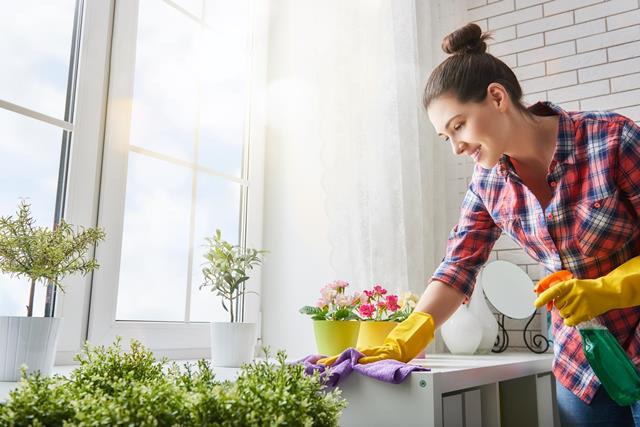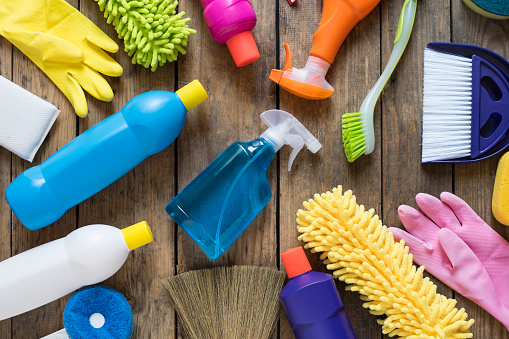
They don’t call it “springtime fresh” for nothing. All winter long, dust, pet hair, and clutter have been accumulating in your quarters, while you huddled inside under the warmth of your HVAC unit. So it’s no wonder you feel the urge to crack open the windows and dust out the cobwebs with the first warm breath of air.
Unfortunately, though, when you’re looking to refresh your home, commercial cleaners can seriously cramp your style. Although we usually think of air pollution as an outdoors-only problem, studies show that indoor air quality may be much more harmful. Mold spores, off-gassing from paints and finishes, and chemicals from cleaners all contribute to a pretty toxic brew in the home—especially when you consider that the average person spends more than 90 percent of their time inside.
However, altering your spring cleaning marathon may be one way to clear out some of these problem substances. A thorough once-over cuts down on two of the most common air hazards: dust and mold. And greening your spring cleaning routine will also limit the presence of volatile organic compounds, or VOCs. The jury’s still out on just how harmful these compounds are, but most experts agree that too much can contribute to or aggravate serious health conditions, such as asthma or even certain cancers.
Meanwhile, between paper towels, cleaning pads, trash bags, and other disposables, cleaning can take a pretty hefty toll on your local landfill, too. Estimates peg annual paper towel use at about 13 billion pounds a year, which adds up to a lot of trees, to say the least. Okay, I hear you saying, I’m convinced—but what can I do about it? Read on to find out!

Microfiber Cloth Towels
As you read above, Americans love their paper towels. To generate those paper products, we cut down about 15 billion trees annually, a lot of it for unnecessary disposables that could easily be replaced with reusable items. In fact, microfiber cloths and mop pads generally get you a better clean—and you can pop them in the washer after you use them and have a fresh new cloth waiting for you after the wash cycle has run. Plus, you’ll never have to buy paper towels again!
Homemade Cleaners
Since chemical cleaners can do questionable things to your health, your best bet is to stick with substances made with less risky ingredients. And the easiest way to know what’s going into your scrubbing bubbles is to make them yourself. Distilled white vinegar and water is one of the purest cleaners around—use about half a cup of vinegar to every cup of water for an all-purpose cleaner. From there, you can add other ingredients: castile soap for a foaming spray or rubbing alcohol for glass cleaner. For greasy or grimy surfaces, coat the area with baking soda and then spray liberally with vinegar—it’s an all-natural solution to your worst kitchen nightmares.
VOC-Free Air Freshener
When it comes to harmful VOCs, air fresheners and candles are some of the worst culprits around. But if you’re using natural cleaners, you might feel like you could use something that smells a little sweeter than eau-de-vinegar. Beeswax candles made with essential oils work well—but you can also go straight to the source and opt for an essential oil diffuser. With scents like vanilla, lavender, sandalwood, or tea tree oil, your rooms won’t smell musty for long. And if you want to keep the freshness going long-term, invest in an air-purifying houseplant, like a peace lily or a spider plant. NASA says these plants can vastly improve air quality—even in space!
A Better Way to Declutter
Cleaning and reorganization go hand in hand, particularly if you take on a big project, like straightening out the basement or garage. Clearing out clutter from your living spaces can actually do great things for your health, too—neuroscience indicates that decluttering can improve your memory and focus, saving you from brain overload. But there’s a better way to clean out your home than just tossing the junk and wiping your hands. Our landfills are full of furniture and other household goods that people get rid of every day—meanwhile, a place like Goodwill or the Salvation Army is happy to take that stuff off your hands. And most of them will come to you for large item donations like furniture!
All-Natural Luffa Sponge
Towels can’t handle every mess, of course. Really caked-on grit requires something a little more forceful, which is where an all-natural luffa sponge gets involved. Natural luffas or sea sponges can be purchased online—just make sure to avoid the plastic look-alikes, since they’re manufactured. In fact, if you’re feeling really industrious, you can even grow your own luffa. Nurseries and seed dealers sell packages of seed for these Egyptian gourds—the fruits, once peeled and dried, make excellent DIY sponges. A sponge you can grow yourself? Now that’s what I call green!
Erin Vaughan is a blogger, gardener and aspiring homeowner. She currently resides in Austin, where she writes full time for Modernize, with the goal of empowering homeowners with the expert guidance and educational tools they need to take on big home projects with confidence.